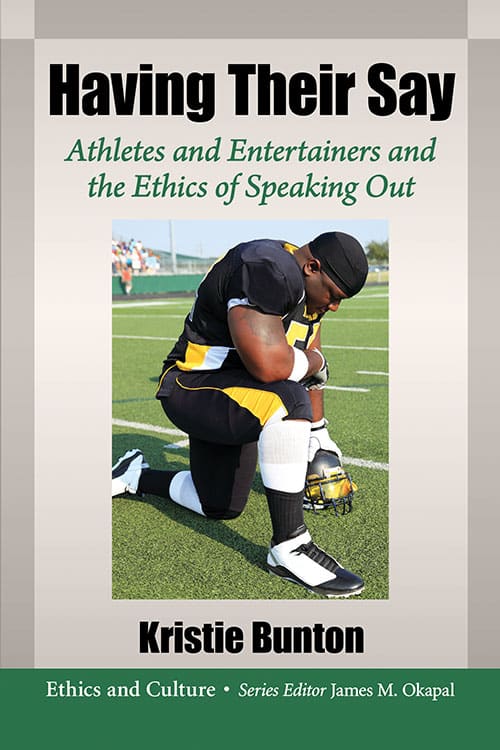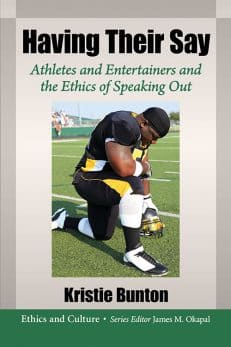Having Their Say
Athletes and Entertainers and the Ethics of Speaking Out
$29.95
In stock
About the Book
After Natalie Maines of The Dixie Chicks expressed her opposition to the Iraq War and President Bush in a country music concert, she was told to “shut up and sing.” When NFL player Colin Kaepernick protested police brutality by kneeling during the national anthem, he was applauded by some and demonized by others. Both had their careers irrevocably altered by speaking out for their beliefs. This book examines the ethical issues that arise when famous people speak out on issues often unrelated to the performances that brought those figures to public attention. It analyzes several celebrity speakers—singers Taylor Swift and the Chicks; satirist Jon Stewart; actor Tom Hanks; and athletes Serena Williams, Stephen Curry, Colin Kaepernick, and Naomi Osaka—and demonstrates that justifiable speaking requires celebrity speakers, journalists, and audiences to consider ethical issues regarding platform, intent, and harm. Celebrity speakers must exercise ethical care in a digital world where audiences equate celebrity status with authority and expertise about public issues. Finally, this book considers how people who are not famous can understand their ethical responsibilities for speaking out about public issues in their own spheres of influence.
Instructors considering this book for use in a course may request an examination copy here.
About the Author(s)
Bibliographic Details
Kristie Bunton
Series Editor James M. Okapal
Format: softcover (6 x 9)
Pages: 271
Bibliographic Info: notes, bibliography, index
Copyright Date: 2021
pISBN: 978-1-4766-8098-9
eISBN: 978-1-4766-4375-5
Imprint: McFarland
Series: Ethics and Culture
Table of Contents
Preface 1
Introduction: Who Gets to Say What? Identifying Questions About Speaking Out by Celebrity Athletes and Entertainers 5
Part I—Ethical Territory to Consider
1. What’s the Cultural Landscape for Speaking Out? Connecting Celebrity Speakers and Public Issues 16
2. What Counts as Speaking Out? Defining the Ethical Construct 33
3. What Ethical Issues Surround Speaking Out? Exploring Power, Privilege, Harm and Justification 48
Part II—Ethical Questions to Answer
4. What Is the Relationship of the Speaker to the Topic? 64
5. What Is the Motivation for Speaking Out? 77
6. What Is the Nature of Any Harm Created? 90
7. Does Speaking Out Promote Dialogue? 105
Part III—Ethical Actors and Topics to Evaluate
8. Shut Up and Play? Athletes Speaking Out About Inequality 122
9. Raise a Fist or Take a Knee? Athletes Speaking Out Symbolically About Injustice 138
10. Who’s an Expert? Celebrities Speaking Out During a Pandemic 156
11. Shut Up and Listen? Ethical Responses to Speaking Out 173
Conclusion: How Do We Speak Out Ethically When We’re Not Famous? 188
Chapter Notes 197
Works Cited by Chapter 231
Index 261
Book Reviews & Awards
Choice Outstanding Academic Title
• “[Celebrities’] approaches to ‘speaking out’ are examined in systematic discussions that are vigorous, challenging, and thought-provoking…plenty to ponder here”—Booklist
• “Bunton offers a profound model for analyzing situational communication, addressing key ethical challenges for those who decide to voice political concerns publicly. … Bunton does a terrific job of outlining specific case studies of political communication in order to portray ethical dilemmas surrounding personal responsibility and public reaction in an ever-evolving society. …powerful…highly recommended”—Choice






